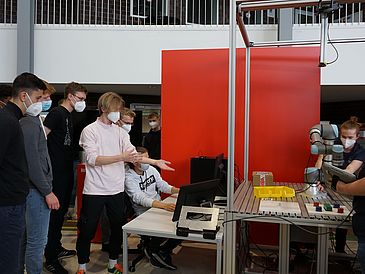The world needs effective and sustainable solutions for energy, production and the mobility of tomorrow, as well as in other areas. And all of this requires engineers. But how does an engineering degree work? What can I expect? Am I able do it? And which specialty would be right for me?
The Faculty of Production Engineering is very familiar with these questions, which is why it has spent many years cooperating with schools in Bremen and Lower Saxony. The faculty has an attractive program in place to inform and advise students during their final school years, supporting them in making choices for their professional future and overcoming any inhibitions. The Federal Ministry of Education and Research has funded some of the initiatives under Research-Focused Studying and Learning Right from the Start – ForstA (Forschend studieren von Anfang an).
Tailor-Made Content and Formats
The program features a wide range of possibilities, such as visits by university lecturers and students to classes, parent-teacher conferences, internal school events, participation in lectures, institute tours, and joint projects. This way, students can learn a great deal about the various engineering career profiles, topics and issues, and about the bachelor’s degree programs in mechanical engineering and process engineering, management and production engineering, and systems engineering at the University of Bremen.
The contents and formats of the cooperations can be individually designed according to the needs and set-up of the schools. The program is primarily aimed at schools with a technical focus or STEM profile in upper secondary education. Since both university lecturers, academic staff, and students are involved in the collaborations, an talks take place at various levels and with varying focus. A wide range of possibilities to get involved are possible, including as fixed components in lessons.
For example, the faculty has already assisted a number of “Jugend forscht” groups in implementing their ideas. With Professor Johannes Kiefer from the Fachgebiet Technische Thermodynamik (Faculty of Technical Thermodynamics) as their sponsor, a team from the Berufliches Gymnasium Wirtschaft at the Schulzentrum Grenzstraße (Bremen) had taken part in the Deutschen Gründerpreis für Schüler 2019. The team had made it into the top ten of 800 teams with its product idea – a flexible partition for pans to cook two dishes at the same time – and its business plan.
School Lessons in Project Teaching at Lower Secondary Level
“Schule in Farbigen Zuständen” (School in Colored States) is another example of a school collaboration. Professor Lutz Mädler from the Leibniz-Institut für Werkstofforientierte Technologien – IWT initiated a cooperation with the Wilhelm-Focke-Oberschule (WFO) in Bremen’s Horn district as part of the Collaborative Research Center called “From Colored States to Evolutionary Structural Materials.” For four years, a class was accompanied for two school lessons a week of project lessons and reported about it in a blog. Teaching modules were evaluated and the results published. The teaching units that were developed will continue to be used in other classes at the WFO beyond the cooperation.
Project in the Project Phase of a 12th Grade Class
This cooperation also has the prospect of being continued. As early as 2019, Professor Michael Freitag from the BIBA – Bremer Institut für Produktion und Logistik contacted the Beruflichen Gymnasium der Berufsbildenden Schulen Osterholz-Scharmbeck (BBS OHZ) and initiated a collaboration. After a two-year pandemic-induced break, two groups of students from a 12th grade class tackled an engineering assignment in their project phase this spring. The task was to use a microcontroller (single-chip microcomputer) to visualize the working status of a robot via LED light bar and to present the project results.
“The perfect assignment for a class focusing on ‘mechatronics’ – and a perfect fit to coincide with the second semester of the Berufliches Gymnasium Technik,” Bernd Hollermann, teacher at the BBS OHZ, happily reports. It was a great challenge for and also an additional burden on his students, but they all enthusiastically participated throughout. This is confirmed by Lennart Rolfs, the BIBA scientist supervising the project: “It went surprisingly well. I didn’t expect such a high level of engagement, nor did I expect such a high level of understanding of the process.”
“It was a most interesting and informative phase, which we plan to repeat and possibly continue in greater depth in technology classes,” says Hollermann. Michael Freitag on continues: “We consider the project a success and are happy to be involved again. BIBA is supporting the University of Bremen with ‘research-based learning’ and ‘project studies.’ Practical experience is of very high priority in our work.”
Sabine Nollmann
Additional Information:
www.fb4.uni-bremen.de/studiumprotect me ?!.html
www.uni-bremen.de/en
Contact:
Thomas Bruns
University of Bremen | Faculty of Production Engineering
Study Center
Tel.: +49 421 218-64 997
Email: thbrunsprotect me ?!uni-bremenprotect me ?!.de
Svenja Schell
University of Bremen | Faculty of Production Engineering
Study Center
Tel.: +49 421 218-64 998
Email: svenja.schellprotect me ?!uni-bremenprotect me ?!.de

